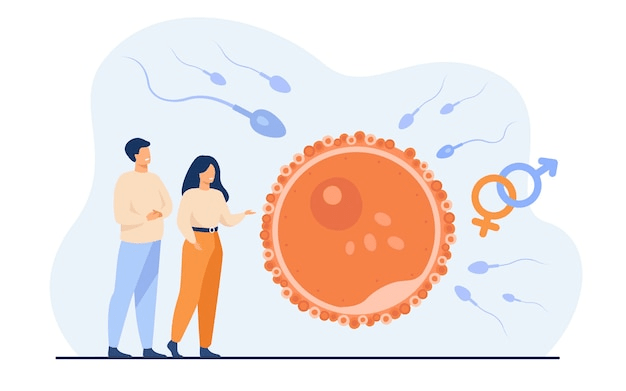
Gene therapy for azoospermia treatment
Introduction Male infertility, especially caused by azoospermia, affects millions of men worldwide. For those suffering from non-obstructive azoospermia, treatment options have been limited. However, thanks

Male fertility issues have become more common in recent years, and one of the key factors influencing male fertility is sperm count. If you’re concerned about your fertility or wondering, if can sperm count be regained? — the answer is yes! Fortunately, there are various natural and medical methods to improve sperm count and boost fertility.
In this article, we’ll explore why sperm count can drop, how you can regain it, and practical tips to improve your overall reproductive health.
Sperm count refers to the number of sperm cells in a man’s semen. A healthy sperm count typically ranges between 15 million to 200 million sperm per milliliter of semen. When sperm count falls below 15 million per milliliter, it is considered low sperm count (oligospermia), which can affect the chances of conception.
Sperm quality, including sperm motility (movement) and morphology (shape), is equally important. However, low sperm count remains one of the most significant issues in male fertility.
A variety of factors can contribute to low sperm count. Some of the most common causes include:
Unhealthy Diet: A diet lacking in essential vitamins and nutrients can reduce sperm production. Diets rich in antioxidants, zinc, and folic acid are critical for healthy sperm.
Alcohol and Smoking: Excessive alcohol intake and smoking can damage sperm quality and reduce count.
Obesity: Excess fat around the abdomen can interfere with hormonal balance, negatively affecting sperm count.
Stress: High levels of stress elevate cortisol, which can affect testosterone levels and sperm production.
Toxins and Chemicals: Exposure to toxins such as pesticides, heavy metals, and industrial chemicals can harm sperm production.
Heat: Prolonged exposure to heat, like frequent use of hot tubs or wearing tight underwear, can raise testicular temperature, reducing sperm production.
Hormonal Imbalances: Conditions that interfere with the production of testosterone or other reproductive hormones can lower sperm count.
Infections: Sexually transmitted infections (STIs) and other infections can damage the reproductive organs and impact sperm production.
Varicocele: A condition where veins in the scrotum become enlarged, leading to increased temperature in the testicles, which can impair sperm production.
As men age, sperm quality and count naturally decline. However, sperm count typically doesn’t reduce drastically until after age 40, although other factors such as lifestyle and health conditions play a role.
The good news is that sperm count can be regained with the right approach. Here are some effective strategies to improve sperm count and boost fertility:
Proper nutrition is key to improving sperm health. Certain nutrients are known to support sperm production and motility:
Zinc: This essential mineral plays a crucial role in sperm production and is found in foods like beef, chicken, spinach, and pumpkin seeds.
Vitamin C and E: These antioxidants help protect sperm from oxidative stress and improve sperm motility. They can be found in citrus fruits, berries, and nuts.
Folic Acid: Found in leafy greens, citrus fruits, and beans, folic acid can enhance sperm count and quality.
Omega-3 Fatty Acids: These are vital for overall sperm health and can be found in fatty fish like salmon and walnuts.
Incorporating these nutrients into your diet can naturally increase sperm count.
Regular physical activity is crucial for overall health, including sperm production. Exercise helps regulate hormone levels, improves blood circulation, and supports weight management, all of which contribute to improved sperm count.
However, over-exercising, especially in endurance sports like marathon running, can lower testosterone levels and reduce sperm count. Aim for a balanced exercise routine with a mix of cardio and strength training.
Being overweight or obese can interfere with sperm production due to hormonal imbalances. Reducing body fat through a healthy diet and regular exercise can improve sperm count.
Smoking and excessive alcohol consumption can significantly reduce sperm count and sperm quality. By quitting smoking and moderating alcohol intake, you can give your sperm count a boost and improve overall fertility.
Chronic stress elevates cortisol levels, which can interfere with testosterone production and impair sperm count. Finding effective ways to manage stress, such as through yoga, meditation, or even seeking professional support, can have a positive impact on fertility.
Sufficient and high-quality sleep is essential for maintaining healthy hormone levels. Aim for 7-9 hours of sleep per night to help regulate testosterone levels and improve sperm count.
There are various natural supplements available that can support sperm health:
L-Carnitine: This amino acid is known to improve sperm motility.
Maca Root: A herb that can boost libido and sperm count.
Coenzyme Q10: An antioxidant that helps improve sperm quality.
Before starting any supplement regimen, it’s important to consult with a healthcare provider to ensure they are safe and suitable for your needs.
In cases of severe low sperm count or infertility, medical treatments may be required. This could include:
Hormonal Therapy: If low sperm count is due to hormonal imbalances, treatments to boost testosterone or other reproductive hormones may help.
Surgery: In cases of conditions like varicocele or blockages in the reproductive system, surgical interventions may improve sperm production.
Assisted Reproductive Technologies (ART): Techniques like intrauterine insemination (IUI) or in vitro fertilization (IVF) may be recommended if natural methods are not effective.
The testicles are located outside the body because they require a cooler temperature for optimal sperm production. Avoid wearing tight underwear, sitting for long periods on hot surfaces, or using hot tubs and saunas, as these activities can increase testicular temperature and reduce sperm count.
Yes, sperm count can be regained with the right lifestyle changes, diet, and medical interventions. By focusing on nutrition, exercise, reducing stress, and seeking professional help when necessary, most men can improve their sperm count and overall fertility.
Remember, if you’re concerned about your sperm count or fertility, it’s always best to consult with a healthcare professional who can help you determine the most appropriate approach for your specific needs.
Boosting sperm count doesn’t happen overnight, but with patience and consistent effort, positive changes are possible.

Introduction Male infertility, especially caused by azoospermia, affects millions of men worldwide. For those suffering from non-obstructive azoospermia, treatment options have been limited. However, thanks

Azoospermia is one of the most challenging causes of male infertility, often leaving men with few options and couples struggling to conceive. But today, an
PROLISTEM® is a Patented Formula
Copyright © 2025 Prolistem®